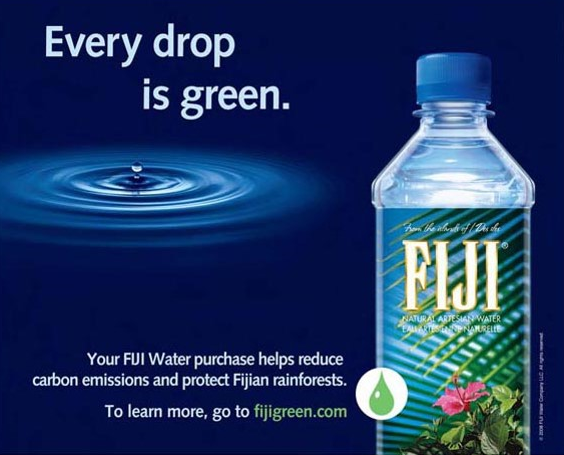The product I am going to analyze is Fiji Water. Fiji Water has the very apparent negative environmental problem of being commodified water sold in a plastic bottle, but they also launched a green campaign at one point in an attempt to make their product appear to be eco-friendly. The below add is from that campaign:

The Hidden Trade Off: This one is the most obvious. Fiji is claiming that they are improving the environment by reducing carbon emissions and protection the rainforests. They do not mention all of the negative effects that producing bottled water has on the world. From emissions, use of unnecessary resources, and after life pollution. They are attempting to make the consumer overlook those issues and see them as green.
No Proof: There is no way of proving that carbon emissions are being reduced by purchasing this product. Most likely because they are not. Plastic bottle production is adding carbon emissions to the atmosphere so it’s a bit like throwing a cup of water on a burning house.
Vagueness: This sin is found in the claim “Every Drop is Green”. What does that even mean? There is no clear definition of the word “green” as used as an environmental term. It is a fad word used to represent environmentally friendly activity, but it is free to be used by anyone without regulation.
Irrelevance: I do not see any statements of irrelevance.
Lesser of Two Evils: This could be found in the bottled water industry if Fiji’s claims are true. Fiji could potentially be the most environmentally friendly of bottled waters, but bottled waters will never be environmentally friendly.
Fibbing: I would go back to the “Every Drop is Green” claim and the idea that Fiji is reducing carbon emissions. I think a little research would find that Fiji is still having a very negative affect on the environment.
Worshiping False Labels: At first, I did not think this sin was committed. Then I noticed the green water drop in the white circle. What is that? I do not believe that symbol has any meaning to it, and I think that Fiji is attempting to give the idea that some organization has place their seal of approval on their product by putting it on their advertisement.
BIG IDEA: DO NOT BUY BOTTLED WATER OF ANY BRAND. IT WILL NEVER BE GOOD FOR THE ENVIRONMENT AND IT IS JUST A SCAM THAT WAS CREATED TO TAKE YOUR MONEY.
Josh Clyde
I’m glad you are bringing attention to this. All bottled water is bad for the environment by virtue of being in a plastic bottle. Any point they make trying to claim anything but that is a lie. If they however, switch to a bottle that is made of something that is biodegradable, then we’ll talk.
~David Bohm
LikeLike
The effects of consumer packing on the environment, as you touched on, are very detrimental. Its good that you made this more of a focal point as a whole. Additionally, I couldn’t agree more with the fact that Fiji water is a prime example of greenwashing.
-Drew Sliger
LikeLike
I agree that bottled water is not a good alternative to tap water in developed countries. But what about in countries where one can not drink the tap water? Would the folks living around Bhopal be better off drinking tap water or bottled water.
Mike Cappel
LikeLike
Of course plastic bottled water is bad for the environment. It is labor-intensive, costs a lot, and burns natural resources. Not to mention it is essentially bottled tap water that you pay for.
LikeLike
Pingback: Attack of the greenwashing crusade – Sophie Ingall
Pingback: グリーンウォッシングって具体的にどういうこと?気をつけたい5つのタイプ
Pingback: FIJI AD Greenwashing – Introduction to Visual Culture